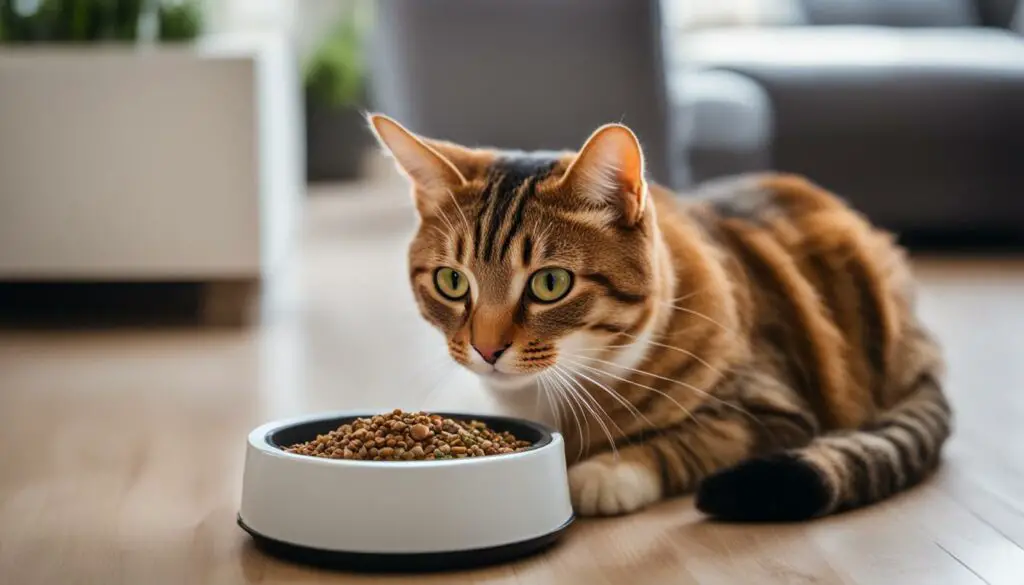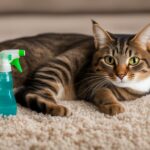Are you tired of the lingering odor of cat food in your home? As a cat owner, I understand the struggle of dealing with unpleasant scents that can come from your furry friend’s meals. But fear not, I have some valuable tips and techniques to help you eliminate that pesky cat food smell and create a fresh-smelling environment for both you and your cat.
By following these simple steps, you’ll be well on your way to banishing the cat food odor from your home. From preventing the smell in the first place to using natural remedies, I’ll cover it all. So, let’s dive in and discover how you can say goodbye to that unwanted cat food scent!
Key Takeaways:
- Properly store cat food to prevent spoilage and odor
- Clean up spills immediately to avoid lingering smells
- Regularly clean litter boxes and food bowls to prevent odor build-up
- Use natural remedies like white vinegar and baking soda to neutralize odors
- Establish a regular cleaning routine to maintain a fresh-smelling home
Preventing Cat Food Smell in Your Home
Preventing cat food smell in your home is essential for maintaining a fresh and pleasant living environment. By implementing a few simple techniques, you can effectively reduce cat food odor and create a more enjoyable space for both you and your furry friend.
Cat Food Storage
Properly storing cat food is crucial in preventing spoilage and the resulting unpleasant odors. Invest in airtight containers or pet food storage containers to keep the food fresh and minimize smells. This will help contain the aroma and prevent it from spreading throughout your home.
Healthy Feeding Practices
Establishing healthy feeding practices for your cat can also help reduce the amount of waste they produce, therefore minimizing the smell. Feed your cat smaller, more frequent meals to prevent overeating and excess waste. Additionally, consider feeding your cat in an isolated area, such as a designated feeding station, to contain the odor.
Clean Up Spills Promptly
If your cat spills their food while eating, be sure to clean up the mess promptly. Leaving food spills unattended can lead to bacterial growth and unpleasant smells. Use a gentle, pet-safe cleaner to wipe down the area and eliminate any residual odors.
Regular Cleaning Routine
Establishing a regular cleaning routine is key to prevent the buildup of cat food smell in your home. Vacuum or sweep the floors regularly to remove any food particles or crumbs. Clean your cat’s bowls and feeding area daily to prevent bacterial growth and odor. Additionally, make it a habit to clean your cat’s litter box frequently to eliminate any lingering smells.
Consider Air Purifiers
Investing in air purifiers can help remove odors from the air and keep your home smelling fresh. Look for air purifiers with activated carbon filters, as these are particularly effective in neutralizing pet odors. Place them strategically around your home, especially in areas where your cat spends a lot of time.
Use Natural Remedies
Incorporating natural remedies can help reduce cat food smell in your home. Baking soda, for example, can be sprinkled in the litter box or near your cat’s feeding area to absorb odors. You can also create a homemade air freshener by combining water, white vinegar, and a few drops of essential oils such as lemon or lavender.
Choose Odor-Reducing Cat Foods
When selecting cat food, opt for varieties that are specifically formulated to reduce odor. These foods are designed to minimize the smell of waste and can help keep your home smelling fresh. Look for options that contain natural ingredients and are free from artificial additives.
By implementing these cat food smell solutions and prevention techniques, you can create a more pleasant and odor-free environment in your home. Remember to store cat food properly, establish a regular cleaning routine, and consider using natural remedies and odor-reducing cat foods. With these strategies in place, you can enjoy a fresh-smelling home while keeping your feline companion happy and healthy.
Cleaning Tips for Cat Food Smell
If you want to eliminate cat food smell from your home, it’s important to follow effective cleaning techniques. By properly cleaning areas where your cat eats or goes to the bathroom, you can prevent odor buildup and create a more pleasant living environment.
One of the key areas to focus on is cleaning up cat food spills promptly. Use a damp cloth or paper towel to wipe away any food that has fallen onto the floor or countertops. By addressing spills immediately, you can prevent food residue from drying and emitting a strong odor.
Regularly cleaning your cat’s litter box is also essential in preventing unpleasant smells. Scoop the litter box at least once a day, removing any waste and soiled litter. It’s also a good idea to completely change the litter and clean the box with mild soap and water on a regular basis.
Additionally, make sure to clean your cat’s food bowls regularly. Use warm water and mild dish soap to remove any leftover food particles and wash away any lingering odors. This will help ensure that your cat’s feeding area remains clean and odor-free.

Quick Tips for Cleaning Cat Food Spills:
- Address spills immediately to prevent odor buildup.
- Use a damp cloth or paper towel to wipe away food residue.
- Clean your cat’s litter box daily and change the litter regularly.
- Wash your cat’s food bowls regularly with warm water and mild dish soap.
Natural Remedies to Remove Cat Food Smell
When it comes to eliminating cat food smell from your home, there are several natural remedies that can do the job effectively. These remedies are not only safe and eco-friendly but also easily accessible.
One of the most popular natural solutions is white vinegar. Its acidic properties help neutralize odors, making it an excellent option for tackling cat food smells. Simply mix equal parts white vinegar and water in a spray bottle and use it to clean surfaces or spray it in the air to freshen up your home.
Another powerful odor neutralizer is baking soda. This versatile ingredient can be used in multiple ways to eliminate cat food smells. You can sprinkle it on carpets or furniture, let it sit for a while, and then vacuum it up. Baking soda can also be mixed with water to create a paste that can be applied to stubborn stains or odorous areas.
Lemon and eucalyptus essential oils can add a refreshing and pleasant aroma to your home while also helping to eliminate cat food smells. Simply mix a few drops of these essential oils with water in a spray bottle and use it to freshen up your living space.
If the smells are particularly stubborn, you may want to consider using enzyme cleaners. These cleaners contain specialized enzymes that break down and eliminate the compounds responsible for the odor. Look for enzyme cleaners specifically formulated for pet odors, such as the rocco & roxie professional strength stain and odor eliminator.
Regular cleaning and maintenance are essential in preventing the buildup of cat food odor. By utilizing these natural remedies, you can effectively remove cat food smells and create a fresh and inviting atmosphere in your home.
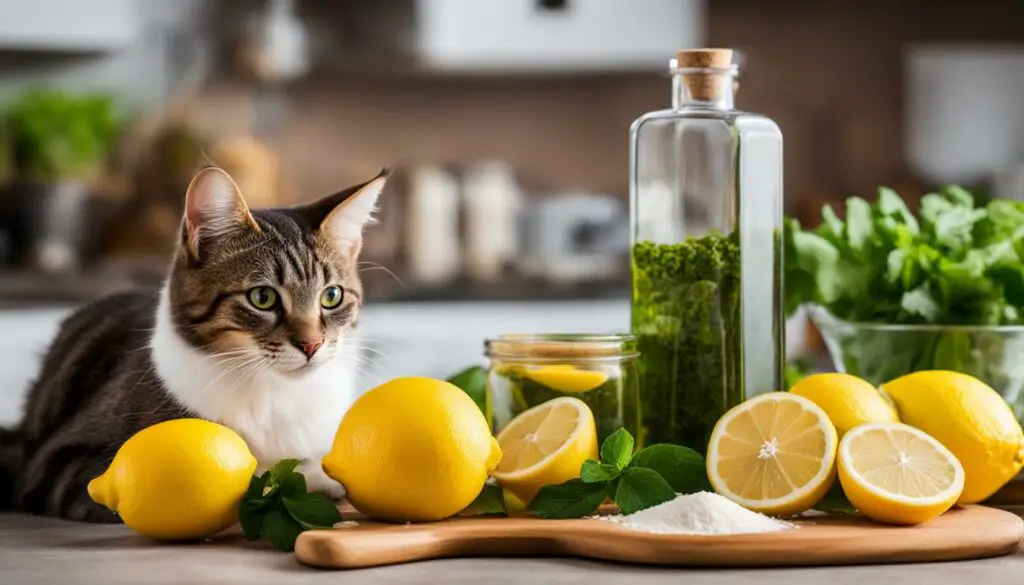
Establish a Regular Cleaning Routine
Keeping a clean home is essential for eliminating cat food smells and ensuring a fresh living environment for both you and your feline friend. Establishing a regular cleaning routine is key to preventing odors from building up and maintaining a tidy space.
Here are some tips for creating a regular cleaning routine:
- Start by designating specific times for daily cleaning tasks, such as sweeping or vacuuming floors, wiping down surfaces, and cleaning the litter box.
- Focus on areas where your cat eats or spends most of their time, as these are the places where food smells are likely to linger. Make sure to clean food bowls thoroughly after each meal to prevent odor buildup.
- Incorporate weekly or bi-weekly deep cleaning tasks, such as washing pet bedding, cleaning curtains or blinds, and dusting hard-to-reach areas.
- Regularly mop or steam clean floors to remove any residual odors that may have absorbed into the surface.
By following a regular cleaning routine, you can stay on top of cat food smells and maintain a fresh-smelling home. Remember, prevention is key, so make sure to address spills or messes promptly to avoid any lingering odors.
Creating a Cleaning Schedule
If you find it challenging to stay consistent with your cleaning routine, consider creating a cleaning schedule. This can help you stay organized and ensure that no cleaning tasks are overlooked. A cleaning schedule can be as simple as a checklist or a calendar with designated cleaning days for different tasks. Find a system that works best for you and stick to it to maintain a clean and odor-free home.
Conclusion:
Establishing a regular cleaning routine is crucial for eliminating cat food smells in your home. By incorporating daily, weekly, and deep cleaning tasks, you can prevent odor buildup and maintain a fresh living environment. Remember to focus on areas where your cat eats, clean food bowls regularly, and address any spills or messes promptly. With a consistent cleaning routine in place, you can enjoy a clean and odor-free home.
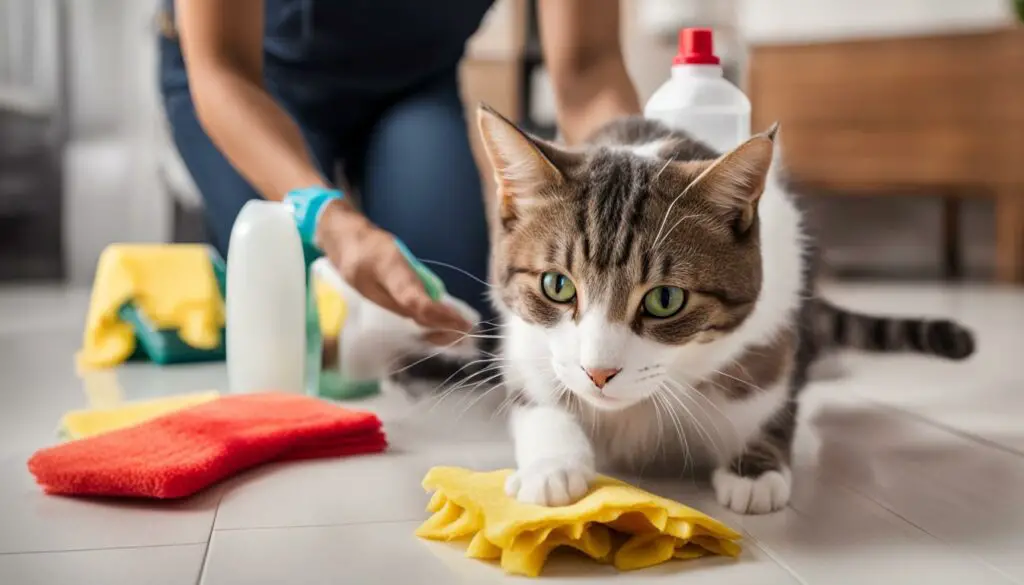
Invest in Air Purifiers or Essential Oil Diffusers
Creating a fresh and inviting atmosphere in your home is essential for both you and your feline friend. One effective way to achieve this is by investing in air purifiers or essential oil diffusers. These devices can help eliminate lingering odors and provide a pleasant aroma throughout your living space.
Air purifiers are designed to filter and cleanse the air, removing particles and odors that may be present. Look for models that include a HEPA filter, as these are highly effective at capturing pet dander, dust, and other allergens. Place the air purifier in a central location, such as the living room or kitchen, to ensure maximum coverage.
Essential oil diffusers are another fantastic option for freshening your home’s aroma. Diffusing essential oils like lavender or eucalyptus can create a calming and refreshing environment. Remember to use pet-safe essential oils and follow the recommended dilution ratios. Be cautious not to use highly concentrated oils that may be harmful to your cat.
Investing in air purifiers or essential oil diffusers is a great way to not only eliminate cat food smell but also enhance the overall ambiance of your living space.
Choosing the Right Essential Oils
When selecting essential oils for your diffuser, it’s important to choose scents that are not only pleasing to you but also safe for your cat. Some essential oils, such as tea tree oil and citrus oils, can be toxic to cats and should be avoided. Opt for pet-safe options like lavender, chamomile, or frankincense. These oils not only provide a pleasant aroma but also have calming effects, helping to create a soothing environment for both you and your furry companion.
Remember to use essential oils in moderation and follow the recommended guidelines for dilution. Cats have a strong sense of smell, so a little goes a long way. Keep the diffuser in a well-ventilated area and ensure your cat has the option to move away from the scent if they prefer.
| Essential Oils Safe for Cats | |
|---|---|
| Lavender | Calming and soothing |
| Chamomile | Relaxing and stress-reducing |
| Frankincense | Grounding and uplifting |
In addition to air purifiers and essential oil diffusers, opening windows and allowing fresh air to circulate can also contribute to a more pleasant home environment. Fresh air can help eliminate odors and provide a sense of freshness.
By incorporating these methods into your daily routine, you can enjoy a home that not only smells clean and inviting but also promotes relaxation and well-being for both you and your beloved cat.
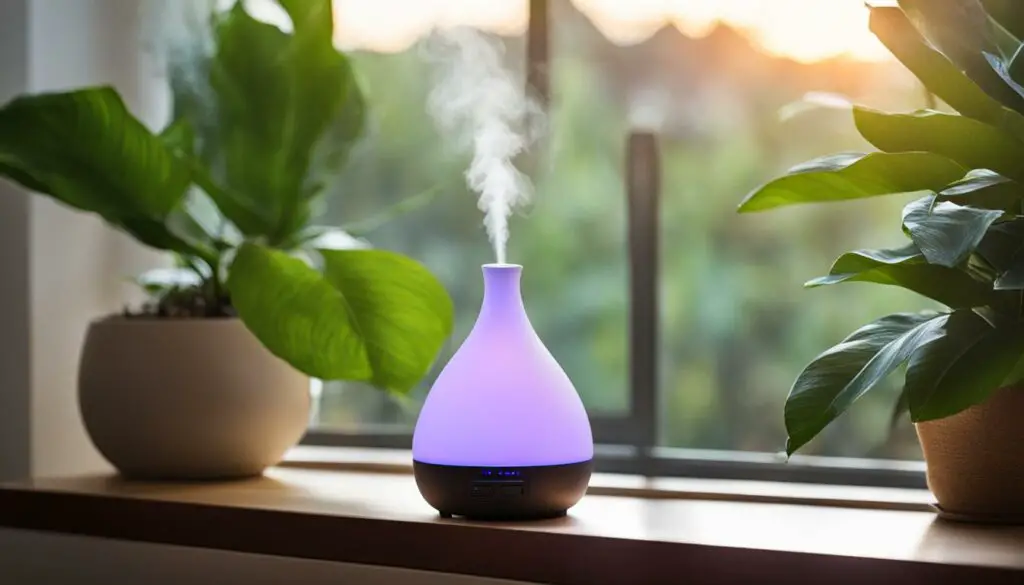
*Image source: Unsplash
Choose Cat Foods with Less Potent Aromas
If you’re looking to reduce cat food smell in your home, one effective strategy is to choose cat foods with less potent aromas. Some cat foods have stronger scents than others, which can contribute to the overall smell in your living space. By opting for cat foods with less aroma, you can minimize the impact of odor and create a more pleasant environment for both you and your furry friend.
When selecting cat foods with less potent aromas, consider options that prioritize odor control. Look for brands that use ingredients and formulations designed to reduce odor without compromising on the nutritional needs of your cat. Many cat food manufacturers have developed specialized formulas that help minimize the smell, ensuring a more enjoyable experience for you and your pet.
In addition to choosing cat foods with less aroma, you may also want to consider feeding your cat in an isolated area. This can help contain any smell that may linger after mealtime. Designate a specific space, such as a laundry room or bathroom, where you can feed your cat and easily clean up any spills or messes. By confining the smell to a specific area, you can further reduce the impact of cat food odor in your home.
Benefits of Choosing Cat Foods with Less Aroma
Choosing cat foods with less potent aromas offers several benefits. Firstly, it can help create a more pleasant living environment by reducing the overall smell in your home. This can be particularly important if you have guests or family members who are sensitive to odors. Additionally, by minimizing the smell of cat food, you can also enjoy a better sense of cleanliness and freshness in your home.
Furthermore, cat foods with less potent aromas can also be beneficial for your cat. Some cats may be sensitive to strong smells and may be more inclined to eat their meals if the odor is less overpowering. By providing a more appealing food smell, you can encourage your cat to maintain a healthy appetite and ensure they’re getting the nutrients they need.
| Benefits of Choosing Cat Foods with Less Aroma |
|---|
| Reduces overall smell in your home |
| Creates a more pleasant living environment |
| Improves cleanliness and freshness |
| Encourages a healthy appetite in cats |
Remember, choosing cat foods with less potent aromas and feeding your cat in an isolated area can help reduce cat food smell in your home. Combine this strategy with other techniques, such as proper storage, regular cleaning, and natural remedies, to create a fresh and odor-free living space for both you and your feline companion.
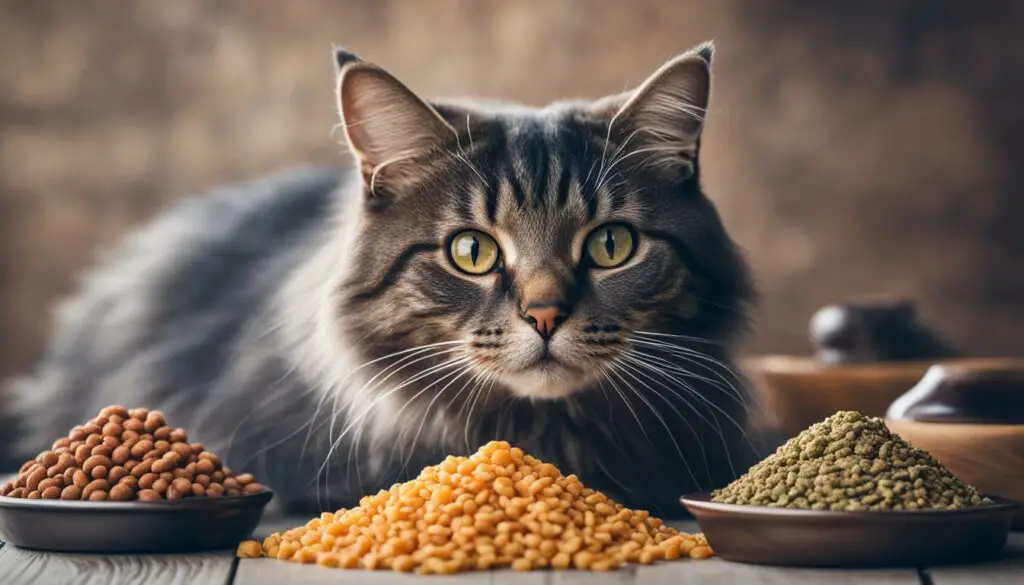
Continue reading to learn more about other effective strategies and natural remedies to eliminate cat food smell from your home.
Why Does Cat Food Smell So Bad?
Have you ever wondered why cat food has such a strong odor? The answer lies in its high protein and fat content. Both protein and fat can break down over time, producing strong and sometimes unpleasant odors.
Cats are obligate carnivores, which means they require a diet rich in animal protein. The high protein content in cat food is essential for their overall health and wellbeing. However, as these proteins break down, they can release volatile compounds that contribute to the strong smell.
In addition to protein, cat food often contains a significant amount of fat. Fat is an important source of energy for cats, but it can also contribute to the strong odor of cat food. When fat molecules react with oxygen, they can produce rancid odors. This is especially true if the food is exposed to air or stored improperly.
Understanding the composition of cat food can help you better address the issue of smell in your home. By choosing high-quality cat food with minimal fillers and preservatives, you can minimize the impact of odor in your living space.
| Key Factors Contributing to Cat Food Smell |
|---|
| High protein content |
| High fat content |
| Protein breakdown |
| Fat oxidation |
By understanding why cat food smells bad, you can take steps to minimize the odor in your home. Proper storage, regular cleaning, and choosing cat foods with less potent aromas can all help create a more pleasant living environment for both you and your feline companion.
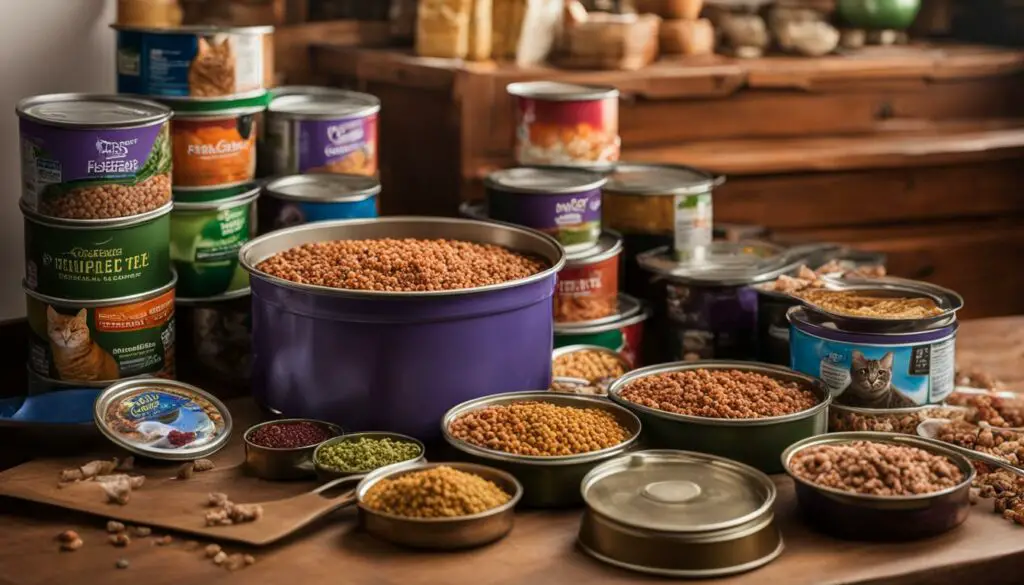
References:
- “Why Does Cat Food Smell So Bad?” PetMD, https://www.petmd.com/cat/nutrition/evr_ct_why-does-cat-food-smell-so-bad. Accessed 20 October 2022.
- “The Science Behind What Makes Cat Food Smell So Bad.” Pawtracks, https://www.pawtracks.com/cats/cat-food-smell/. Accessed 20 October 2022.
Cat Food Smell Masking Agents
When it comes to eliminating cat food smell in your home, there are several natural agents you can rely on. Baking soda, white vinegar, coffee grounds, vanilla extract, and lemons are all effective in neutralizing unwanted odors. These substances have deodorizing properties that can help freshen up your living space.
Firstly, baking soda is a versatile ingredient that can absorb and neutralize odors. You can sprinkle it on carpets, furniture, or even in the litter box to help eliminate cat food smell. Leave it on for a few hours or overnight, then vacuum or wipe it away for a fresher-smelling environment.
White vinegar is another powerful cat food odor-fighting agent. Mix equal parts white vinegar and water in a spray bottle and use it to clean areas where cat food spills may have occurred. Vinegar helps eliminate odors and leaves a clean scent behind. Just be sure to test it on a small, inconspicuous area first to ensure it won’t damage the surface.
Coffee grounds not only provide a pleasant aroma but also absorb unwanted odors. Place a bowl of coffee grounds near areas with cat food smell, such as the kitchen or living room. The coffee grounds will help neutralize the odors and leave a subtle coffee scent in the air.
Vanilla extract is known for its sweet scent, which can help mask cat food odors. Dab a small amount of vanilla extract onto a cotton ball and place it in areas where the smell is particularly strong. The vanilla aroma will help counteract the unpleasant cat food smell and create a more inviting atmosphere.
Lemons are also effective in eliminating cat food odors. Cut a lemon in half and place it in a bowl near the source of the smell. Lemons have natural deodorizing properties that can help freshen up the air and reduce the lingering scent of cat food.
By using these baking soda, white vinegar, coffee grounds, vanilla extract, and lemons as natural agents, you can effectively combat cat food smell in your home. Incorporate these remedies into your cleaning routine to maintain a pleasant and odor-free living environment.

Surround Cat Food with Newspaper
When it comes to keeping your cat’s food fresh and preventing the smell from permeating your home, newspaper can be a surprisingly effective solution. Not only does it help to hide the scent of cat food in a dry pantry or refrigerator, but it also has deodorizing properties that can absorb and neutralize unwanted odors. Plus, it’s a cost-effective and eco-friendly option.
To utilize newspaper as a deodorizer for your cat’s food, simply wrap the products in a few sheets or place crumpled newspaper inside containers. This will help to keep the smell contained and prevent it from spreading throughout your home. The newspaper acts as a barrier, effectively masking the odor of the cat food.
Remember to replace the newspaper regularly to ensure optimal odor absorption. By using newspaper as a deodorizing agent, you can enjoy a fresh-smelling home while keeping your furry friend’s food conveniently stored.
“Newspaper is a simple yet effective way to hide the scent of cat food and keep your home smelling fresh.” – Dr. Emily Carter, Veterinarian.

Summary:
- Newspaper can be used to hide the scent of cat food in a dry pantry or refrigerator.
- It has deodorizing properties that help absorb and neutralize unwanted odors.
- Wrap cat food products or place crumpled newspaper inside containers to contain the smell.
- Regularly replace the newspaper to maintain optimal odor absorption.
Store Cat Food in Kitchen Canisters
If you want to keep your cat food fresh and prevent any lingering smells from permeating your home, storing cat food in kitchen canisters is an excellent solution. These airtight containers not only help maintain the freshness of the food but also seal in any odors, ensuring that your kitchen remains odor-free.
When choosing kitchen canisters for storing cat food, opt for ones that are specifically designed for this purpose. Look for containers that have a secure seal to keep air and moisture out, as this can lead to spoilage and unpleasant smells. Additionally, consider investing in canisters made of materials that are easy to clean, such as plastic or glass, to ensure that the container remains hygienic.
By storing cat food in kitchen canisters, you can enjoy the convenience of having your pet’s food readily accessible while keeping your home smelling fresh and clean. It’s a simple yet effective way to maintain a pleasant living environment for both you and your furry friend.

Use Pet Food Storage Containers
If you give your cat dry food, investing in a high-quality pet food storage container is essential for keeping the food fresh and maintaining its nutritional quality. These specialized containers create an airtight barrier that keeps out moisture, insects, and odors, ensuring that your cat’s food stays fresh for longer periods.
Pet food storage containers are designed specifically for storing pet food, with features that help preserve its quality. They come in various sizes to accommodate different quantities of food, making it easy to store and access the right amount for your cat’s needs.
By using pet food storage containers, you can prevent the cat food from becoming stale or losing its flavor, as exposure to air can lead to a decrease in quality over time. These containers are also convenient for organizing and decluttering your pantry or storage area, as they keep the food neatly contained.
| Benefits of Pet Food Storage Containers | Features |
|---|---|
| Keeps food fresh and flavorful | Airtight seal |
| Prevents moisture and insect infestation | Durable construction |
| Convenient for storage and organization | Various sizes available |
| Preserves nutritional value | Easy to open and close |
Ensure that you choose a pet food storage container made of high-quality materials that are safe for storing food. Look for containers that are BPA-free and easy to clean, as hygiene is essential for your cat’s health.
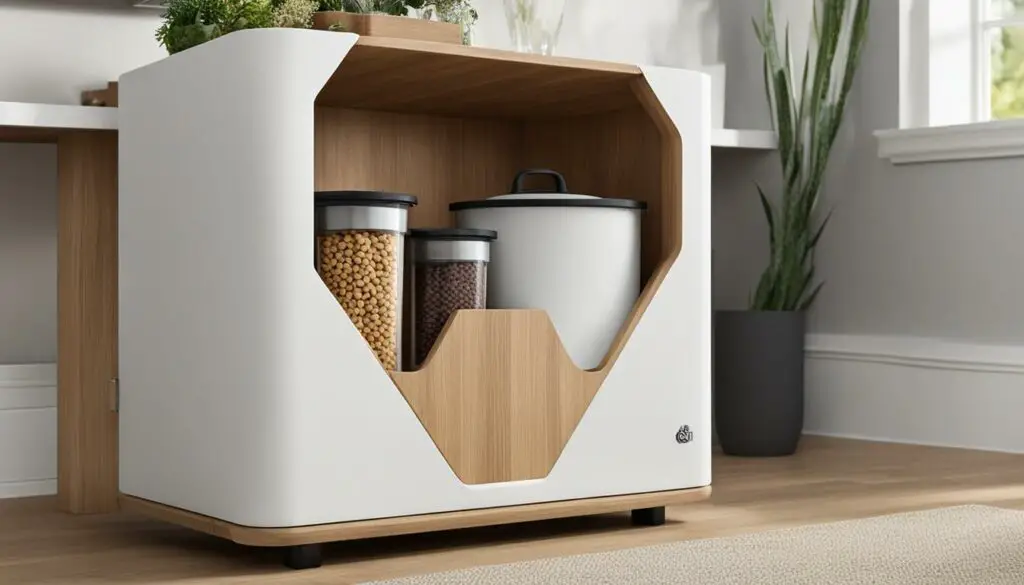
Proper Maintenance of Pet Food Storage Containers
To maximize the longevity and effectiveness of your pet food storage containers, it’s important to follow proper maintenance practices:
- Regularly clean the containers with warm soapy water and thoroughly dry them before refilling.
- Inspect the containers for any signs of damage or wear, such as cracks or loose seals, and replace them if necessary.
- Store the containers in a cool and dry location, away from direct sunlight or extreme temperatures, to maintain the freshness of the food.
- Label the containers with the date of purchase or the expiration date of the cat food to ensure you use it within the recommended timeframe.
By incorporating the use of pet food storage containers into your cat care routine, you can keep your cat’s food fresh and free from any unwanted odors or contaminants. This not only benefits your cat’s health but also ensures a hassle-free feeding experience for both you and your beloved feline companion.
Important Tips for Getting Rid of Cat Smell
If you’re dealing with unpleasant cat smells in your home, here are some important tips to help you eliminate them. It’s essential to be mindful of the products you use and the cleaning techniques you employ to ensure the well-being of both your cat and your living environment. Here are some key considerations:
1. Avoid Ammonia-Based Products
When cleaning cat urine or eliminating cat smells, it’s crucial to steer clear of products that contain ammonia. Ammonia has a scent similar to urine, which may attract your cat to return to the same spot for elimination. Instead, opt for pet-safe cleaning solutions specifically designed to eliminate odors without harmful chemicals.
2. Use Natural Deodorizers
Natural deodorizers such as baking soda, white vinegar, coffee grounds, lemon, and vanilla extract can be effective in neutralizing cat smells. Sprinkle baking soda on carpets, upholstery, or cat bedding, let it sit for a few hours, and then vacuum it up. Mix white vinegar with water in a spray bottle and use it to clean surfaces and eliminate odors.
3. Regularly Clean and Maintain Litter Boxes
Regular cleaning of your cat’s litter box is crucial to prevent odor buildup. Scoop the litter box daily to remove solid waste and clumps, and completely change the litter at least once a week. Consider using litter box liners and odor-absorbing litter to minimize odor permeation.
By following these important tips, you can effectively get rid of cat smells and create a fresh and welcoming environment for both you and your feline friend. Remember to use pet-safe cleaning products, incorporate natural deodorizers, and maintain a clean litter box to ensure a pleasant living space. With these practices in place, you’ll enjoy a home that smells clean and inviting.

When All Else Fails, Consider Professional Cleaning
While there are many effective methods for getting rid of cat food smell, sometimes the odor can persist despite our best efforts. In these cases, it may be worth considering professional cleaning services to tackle the problem. A professional cleaning company has the expertise, specialized equipment, and cleaning agents to deep clean your home and eliminate stubborn odors.
Professional cleaners can target areas that are prone to odor buildup, such as carpets, upholstery, and other surfaces. They can use high-powered steam cleaners, enzymatic cleaners, and odor-neutralizing agents to effectively remove cat food smell from your living space. Additionally, they can provide a thorough cleaning of your cat’s litter box, food bowls, and other areas where cat odors may be present.
Hiring a professional cleaning service not only saves you time and effort but also ensures that the smell is completely eradicated. They can also offer advice on preventing future odor issues and maintaining a fresh-smelling home. Remember to choose a reputable company that specializes in pet odor removal to ensure the best results.
Conclusion
After exploring various methods to get rid of cat food smell in your home, it’s clear that implementing a combination of tips and techniques is the most effective approach. By following these guidelines, you can create a pleasant and odor-free living environment for both you and your furry friend.
Start by preventing cat food smell through proper storage and healthy feeding practices. Regularly clean areas where your cat eats or goes to the bathroom, using natural remedies like white vinegar, baking soda, and essential oils. Establishing a regular cleaning routine and investing in air purifiers or essential oil diffusers can also help maintain a fresh home aroma.
Furthermore, consider choosing cat foods with less potent aromas or feeding your cat in an isolated area to reduce the impact of cat food smell. Understand that cat food smells bad due to its high protein and fat content, and use masking agents like baking soda, white vinegar, coffee grounds, vanilla extract, and lemons to neutralize unwanted odors.
If all else fails, you can consult a professional cleaning service to deep clean your house and eliminate stubborn cat smells. Remember, a fresh-smelling home is attainable with the right tips and techniques in place.
FAQ
How can I prevent cat food smell in my home?
You can prevent cat food smell in your home by properly storing cat food, practicing healthy feeding habits, and regularly cleaning areas where your cat eats or goes to the bathroom.
What cleaning techniques can I use to prevent cat food odor build-up?
To prevent cat food odor build-up, you should regularly clean litter boxes and food bowls using effective cleaning techniques. You can also treat different surfaces and areas with natural agents such as white vinegar, baking soda, lemon, and eucalyptus essential oils.
Why does cat food smell bad?
Cat food smells bad due to its high levels of protein and fat which can produce strong odors as they break down.
How can I mask cat food smell naturally?
You can use natural agents such as baking soda, white vinegar, coffee grounds, vanilla extract, and lemons to mask cat food smell in your home.
How should I store cat food to prevent odor?
You should store cat food discreetly in airtight containers such as flour tins or cookie jars to prevent odor from spreading and keep the food fresh.
Are there any professional cleaning services that can help eliminate cat smell?
Yes, if you have tried various methods and still can’t get rid of cat smell in your home, you can consider hiring a professional cleaning service to deep clean your house.
Source Links
- https://www.hepper.com/how-to-get-rid-of-cat-smell-in-house/
- https://toxictocats.com/cat-food-smell-in-house/
- https://catfans.info/how-to-get-rid-of-cat-food-smell/

